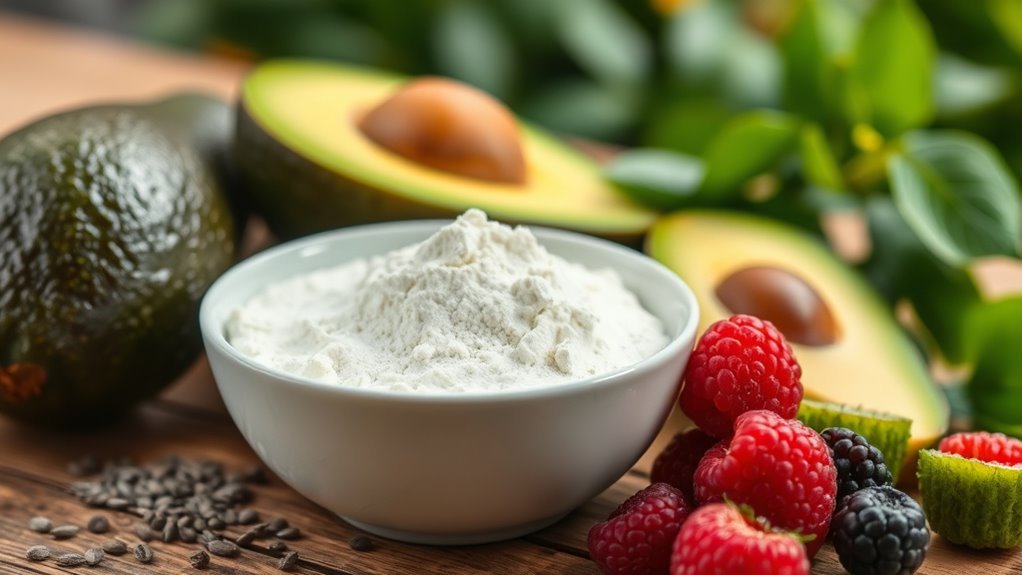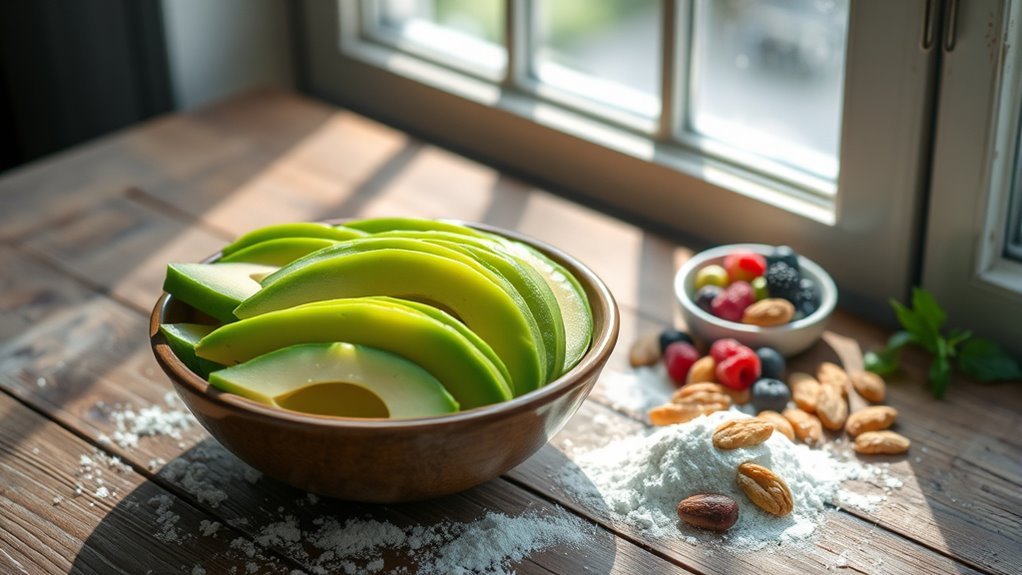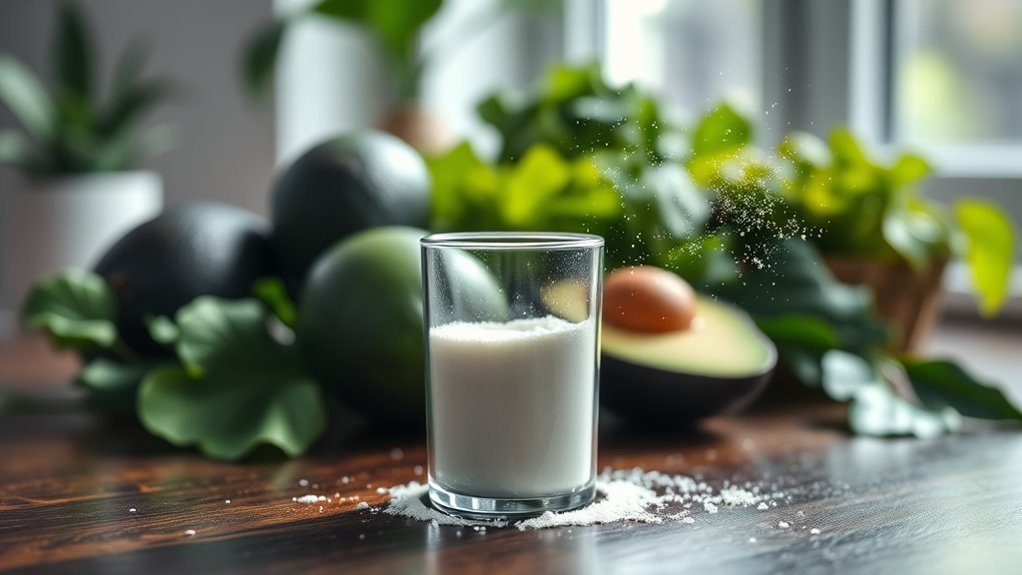Yes, collagen is keto-friendly due to its very low carbohydrate content. This makes it a suitable supplement for anyone on a low-carb diet. Both hydrolyzed collagen and collagen peptides contain virtually no carbs, allowing you to enjoy their health benefits without disrupting ketosis. You can easily incorporate collagen into your daily routine by adding it to beverages, smoothies, or soups. Keep exploring to learn more about collagen’s benefits and ways to use it effectively.
What Is Collagen?

Although you might have heard a lot about collagen in beauty and health discussions, it is essential to understand what it actually is. Collagen is a protein that forms a significant part of your skin, bones, and connective tissues. Its structure consists of triple-helix formations that provide strength and elasticity. Your body synthesizes collagen naturally, but this process declines with age, leading to visible signs of aging. Factors like diet, lifestyle, and genetics can influence collagen synthesis. By understanding these fundamentals, you can make informed choices about supporting your body’s collagen levels. Whether you’re exploring dietary options or supplements, knowing collagen’s role in your body can empower you to prioritize your health and well-being.
The Benefits of Collagen

Collagen offers a range of benefits that can greatly impact your overall health and appearance. One major advantage is its ability to improve skin elasticity, which can lead to a more youthful and vibrant complexion. As you age, your body produces less collagen, often resulting in wrinkles and sagging skin. Supplementing with collagen can help counteract these effects.
Additionally, collagen plays an essential role in joint health. It helps maintain the integrity of cartilage, which cushions your joints and reduces discomfort during movement. By incorporating collagen into your routine, you might experience less joint pain and improved mobility. Embracing collagen isn’t just about aesthetics; it’s about enhancing your overall well-being and enjoying a more active, fulfilling lifestyle.
Types of Collagen Supplements

When choosing collagen supplements, you’ll find various sources like bovine, marine, and poultry, each offering unique benefits. They also come in different forms, such as powders, capsules, and liquid, allowing you to pick what best fits your lifestyle. Understanding these options can help you make an informed decision about which collagen type is right for you.
Types of Collagen Sources
There are several types of collagen sources available, each offering unique benefits and characteristics. Bovine collagen, derived from cows, is rich in type I and type III collagen, which supports skin elasticity and joint health. It’s widely used in supplements and is known for its high bioavailability. On the other hand, marine collagen, sourced from fish, boasts a smaller molecular size, making it easier for your body to absorb. It’s particularly praised for its skin-enhancing properties, promoting hydration and reducing wrinkles. Both collagen types are keto-friendly, fitting seamlessly into your low-carb lifestyle. Depending on your specific needs—whether it’s skin health or joint support—you can choose the source that best aligns with your goals for freedom and wellness.
Collagen Forms and Formats
While exploring collagen supplements, you’ll find a variety of forms and formats tailored to different preferences and lifestyles. Common collagen types include hydrolyzed collagen, collagen peptides, and collagen powders, each offering unique benefits. Hydrolyzed collagen is easily absorbed, making it a popular choice for those seeking quick results. Collagen powders can be mixed into beverages or foods, providing versatility in how you incorporate it into your diet. You might also encounter collagen bars or capsules, which offer convenient on-the-go options. The sources of collagen, such as bovine, marine, and chicken, can influence the type you choose based on dietary preferences. Ultimately, selecting the right form depends on your lifestyle and goals.
Is Collagen Low in Carbs?
If you’re considering collagen as part of your keto diet, you’ll be pleased to know that it’s exceptionally low in carbohydrates. Most collagen types, including hydrolyzed collagen and collagen peptides, contain virtually no carbs, making them an excellent choice for those watching their carb content. This is vital for maintaining ketosis, where low carb intake is essential. The minimal carb content in collagen allows you to enjoy its benefits—like improved skin elasticity and joint health—without disrupting your dietary goals. Plus, since collagen is derived from animal sources, it’s compatible with various protein-rich diets. So, you can confidently incorporate collagen into your routine, knowing it won’t interfere with your keto lifestyle.
How to Incorporate Collagen Into a Keto Diet
Incorporating collagen into your keto diet can be both simple and versatile. You can choose from various collagen supplement options, like powders or capsules, and easily add them to your daily routine. Additionally, experimenting with collagen-rich recipes can help you enjoy the benefits while staying within your carb limits.
Collagen Supplements Options
Collagen supplements can be a valuable addition to your keto diet, offering benefits without disrupting your macronutrient balance. There are various collagen types, such as Type I, II, and III, each providing unique benefits for skin, joints, and gut health. When selecting a supplement, consider reputable supplement brands that prioritize quality and sourcing. Look for hydrolyzed collagen or collagen peptides, as they’re easily absorbed and versatile. You can easily incorporate these supplements into your routine by mixing them into beverages, smoothies, or even soups. By choosing the right collagen type and brand, you can enhance your keto journey while enjoying the freedom of diverse dietary choices. It’s a simple way to bolster your health and wellness goals.
Collagen Recipes Ideas
While you’re exploring ways to enhance your keto diet, adding collagen can be both simple and delicious. You can easily incorporate collagen into your meals with these ideas:
| Collagen Smoothies | Collagen Snacks |
|---|---|
| Spinach and avocado smoothie | Collagen protein bars |
| Berry almond milk smoothie | Cheese crisps with collagen |
| Coconut and cocoa smoothie | Collagen-infused nut mix |
These recipes not only boost collagen intake but also fit seamlessly into your keto lifestyle. Collagen smoothies provide a nutritious start to your day, while collagen snacks offer a satisfying option between meals. By mixing and matching, you can enjoy the freedom of variety without compromising your dietary goals.
Potential Concerns and Considerations
When considering the integration of collagen into a keto diet, it is essential to weigh potential concerns and considerations. First, you should examine collagen sourcing; not all products are created equal. Some may come from grains or sugars, which could compromise keto compatibility. Additionally, while collagen is low in carbs, it doesn’t provide complete proteins, so you’ll want to guarantee you’re meeting your protein needs from other sources. Also, keep in mind that individual responses vary; some might find that collagen affects their ketosis. Finally, always consult a healthcare professional before making significant dietary changes, especially if you have underlying health issues. Balancing collagen’s benefits with these considerations can help you make informed choices.
Frequently Asked Questions
Can Vegetarians or Vegans Consume Collagen Supplements?
Can vegetarians or vegans consume collagen supplements? Not directly, since traditional collagen sources come from animal products. However, there are vegan alternatives that promote collagen production in your body. Ingredients like spirulina, vitamin C-rich foods, and certain amino acids might help your body synthesize collagen naturally. If you’re looking for plant-based options, consider supplements specifically formulated for vegans. Always check the label to verify it aligns with your dietary choices for freedom in nutrition.
Does Collagen Support Weight Loss on a Keto Diet?
Collagen can support weight loss on a keto diet by promoting muscle maintenance and reducing cravings, which are key for keto weightloss. Its benefits include improved metabolism and satiety, helping you stay on track with your dietary goals. While it won’t directly burn fat, incorporating collagen into your routine can enhance overall body composition and health. So, if you’re looking for a supplement to complement your keto lifestyle, collagen’s worth considering.
Are There Any Side Effects of Collagen Supplementation?
While collagen supplementation is generally safe, some people may experience collagen side effects such as digestive discomfort, bloating, or allergic reactions, especially if taken in high doses. It’s essential to start with a lower collagen dosage and gradually increase it to assess your body’s response. As with any supplement, it’s wise to consult a healthcare professional to guarantee it aligns with your health goals and needs, giving you the freedom to make informed choices.
How Does Collagen Affect Skin Aging on Keto?
Collagen can greatly slow skin aging, with studies showing a 30% improvement in skin elasticity after supplementation. On a keto diet, where healthy fats replace carbs, collagen benefits your skin by boosting hydration and elasticity, making it firmer and more youthful. As you embrace keto, adding collagen can help combat dryness often associated with low-carb diets, ensuring your skin remains vibrant and resilient. It’s a simple way to support your beauty through dietary choices.
Can I Take Collagen With Other Supplements?
Yes, you can take collagen with other supplements. Different collagen types can complement your routine, especially when paired with vitamins like C or E, which support skin health. For ideal results, consider supplement timing; taking collagen with meals can enhance absorption. Always consult with a healthcare professional before starting new supplements to guarantee they fit your individual needs and won’t interfere with each other. Enjoy the freedom to personalize your health journey!
Frequently Asked Questions about Collagen and the Keto Diet
1. Is collagen protein keto-friendly?
Yes, collagen protein is considered keto-friendly. It contains no carbohydrates, which makes it suitable for those following a ketogenic diet. Collagen is primarily composed of amino acids, which can help support muscle maintenance and overall health while adhering to low-carb eating habits.
2. Can I use collagen supplements while on a keto diet?
Absolutely! Collagen supplements can be a great addition to a keto diet. They provide essential amino acids that support skin, joint, and gut health without adding any carbs. Just be sure to choose high-quality, pure collagen products that do not contain added sugars or fillers that could impact your carb intake.
3. Are there any carbohydrates in collagen powder?
Most collagen powders are free from carbohydrates. Pure collagen peptides typically have zero carbs, making them an excellent choice for anyone following a keto diet. However, it’s important to check the product label, as some flavored or mixed collagen products may contain added sugars or carbs.
4. How does collagen fit into a keto diet?
Collagen can fit seamlessly into a keto diet as it provides a protein source that does not disrupt ketosis. It can be used in various ways, such as mixed into smoothies, added to coffee, or used in baking recipes. Incorporating collagen can help maintain protein intake while supporting overall health, especially for those who may not consume enough protein from traditional sources.
5. What are the benefits of consuming collagen on a keto diet?
Consuming collagen on a keto diet offers several benefits, including improved skin elasticity, joint health, and digestive support. It can also help in muscle repair and recovery, which is crucial for those engaging in regular exercise. Additionally, collagen may enhance the overall quality of a ketogenic diet by providing a variety of amino acids that support bodily functions without compromising ketosis.
References
- https://www.ncbi.nlm.nih.gov/pmc/articles/PMC6461183/
- https://www.healthline.com/nutrition/collagen-keto-friendly
- https://www.webmd.com/diet/what-is-the-keto-diet
- https://www.uclahealth.org/health/what-is-collagen
- https://www.mayoclinic.org/healthy-lifestyle/nutrition-and-healthy-eating/expert-answers/collagen-supplements/faq-20058073
- https://www.ncbi.nlm.nih.gov/books/NBK558883/
- https://www.nutrition.gov/topics/nutrition-101/what-collagen
- https://www.verywellfit.com/what-is-collagen-5115814


